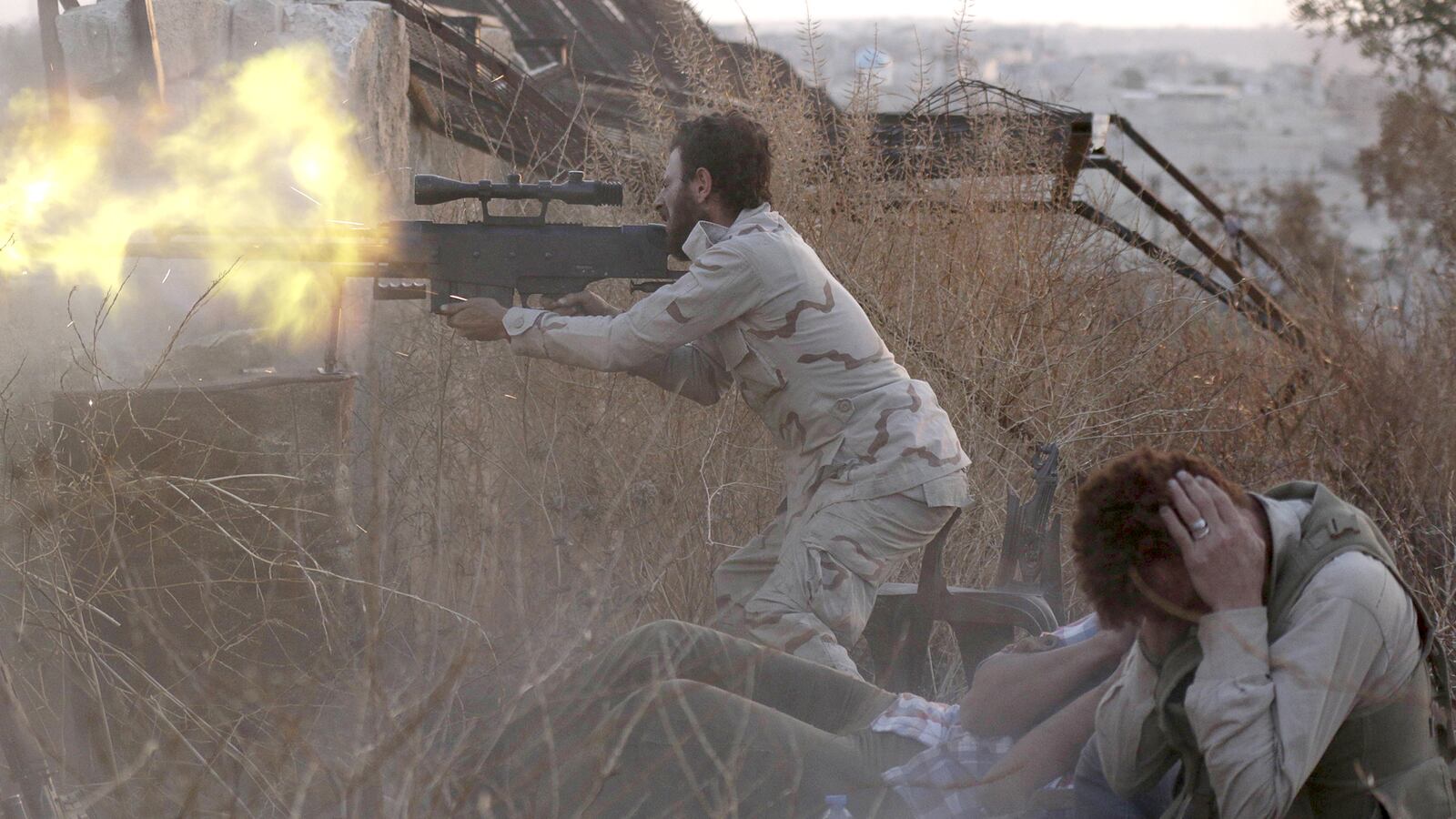ISTANBUL — An “update on our strategy to degrade and destroy” the Islamic State is how the White House has been promoting President Barack Obama’s remarks Monday at the Pentagon. The president talked about a “systematic campaign of airstrikes” against the extremists and of increasing support to forces fighting the militants in Iraq, but when it came to Syria Obama only fleetingly mentioned the administration’s once-vaunted “train and equip” program for moderate rebels.
Specifically, POTUS said, “I have made it clear to my team that we will do more to train and equip the moderate opposition in Syria.”
Well, here on the ground in Turkey that sounds like an empty promise for an almost empty program. More than half a year after “train and equip” was announced as the means to get friendly non-American boots on the ground to fight the Islamic State extremists, widely known as ISIS or ISIL, we’re not talking battalions or brigades, we’re barely talking companies and platoons.
In fact in testimony to a Senate panel Tuesday Secretary of Defense Ash Carter acknowledged that the number being trained now is just 60. That prompted Sen. John McCain to dub the admission “troubling.”
“Secretary Carter’s testimony this morning that the United States is currently training only 60 Syrian fighters to combat ISIL is a troubling admission that the United States has no coherent strategy against this terrorist army,” the Republican Senator said.
He added: “The President’s goal of degrading and ultimately destroying ISIL will never be accomplished while the conflict in Syria continues. Bashar Assad’s war on the Syrian people has fostered the conditions for ISIL’s continued growth, recruitment, and radicalization of Muslims across the world.”
Earlier this month, General Martin Dempsey, the chairman of the U.S. Joint Chiefs of Staff, blamed the holy month of Ramadan for the current stall in the program President Obama once described as a key part of his strategy to defeat ISIS.
The general explained, in effect, that in this holy month of Ramadan, what with fasting all day and family festivities most of the night, the rebels were too sleepy, thirsty, and hungry for war and dozens had gone AWOL because they wanted to spend time with their families.
The Ramadan rationalization joins a long list of explanations offered by Pentagon chiefs defending a program that was meant to be training 5,400 “moderates” a year for the next three years.
First announced last October, the origins of the program go back further: Administration officials were briefing in May 2014 about limited training and equipping to combat extremists, but that morphed into a bigger mission after Abu Bakr al-Baghdadi’s men seized Mosul, Iraq’s second-largest city, and announced a caliphate straddling Syria and Iraq. In the autumn, Congress earmarked $500 million for the program with the aim of training as many as 15,000 troops within three years.
The slowness of the timetable prompted skepticism from the start, with wags asking whether Syria would even exist by the time the envisaged force was at full strength.
Good point. Last week, a senior Israeli defense official declared that for all intents and purposes “Syria is gone.”
“The funeral will be declared in due time,” Amos Gilad, a strategic adviser to Israeli Defense Minister Moshe Yaalon, told a conference. “This Bashar Assad, he will be remembered in history textbooks as the one who lost Syria.”
Gilad’s point is borne out by looking at the map of who controls what and where, and aside from some flux along a few of the lines the partition of Syria is clear—President Bashar al-Assad controls just a fifth of the country, with the heart of his territory based on the strongholds of his minority Alawite sect. The rest is in the hands of the Islamic State’s savage extremists, or the Kurds. or a hodgepodge of rebel militias dominated mainly by Islamists and al Qaeda affiliate Jabhat al-Nusra.
The train-and-equip program has nothing to compete with the forces already on the ground. Last month, U.S. Defense Secretary Ash Carter told a House committee that the project involving Syrian rebels is "much trickier" than a similar effort underway with the Iraqis, in part because of concerns over controlling equipment issued to Syrian trainees. Dempsey has emphasized the demanding vetting process for the low numbers in training. Officials claim they have been training just over 100, but they have talked about dozens going AWOL for Ramadan.
Pentagon officials say 1,500 volunteers are waiting in the wings for the completion of their vetting—but they have been saying that for weeks now.
According to Syrian rebel commanders, the two biggest problems with the mission remain the same as when Obama announced train-and-equip last October, and it was hopelessly misconceived from the start. The first problem, they argue, was how tightly Washington defined “moderate,” and the second problem rested with the administration’s insistence that the train-and-equip force could only be used against the extremists of ISIS, and not against Assad.
Few veteran rebel fighters want to join a force that is focused only on ISIS. They argue that Assad is responsible for many more deaths among them and their extended families than ISIS has been. The more the Americans have insisted that the force must ignore Assad, the more resistance the program has encountered because of suspicions the U.S. may betray the Syrian revolution, and the more disdain rebel groups have shown toward Washington.
At first U.S. officials did approach some established rebel militias to see if they would enlist some of their fighters for the program, but they were few takers. Rebel leaders said they couldn’t spare any of their men from the front lines.
“I told them from the start I wouldn’t offer one man as long as the force was only going after ISIS,” says a rebel commander who asked not to be named since he still has some dealings with U.S. officials. Based in the hotly contested countryside near Aleppo, he says as far as he is concerned the scheme lacked military logic. “I am meant to weaken my forces so that I would be unable to hold the line against whoever attacks me, Assad or ISIS? That’s absurd.”
And as time has gone by there has been an erosion of moderate forces across the board, reducing the pool for the Americans to trawl in. Sectarianism has gained more ground among disillusioned and angry fighters, who have thrown in their lot with larger Islamist brigades or aligned with al-Nusra for self-protection or because at least these groups were making some gains against Assad.
Other fighters have just quit the war. Mohammed, a 32-year-old from the town of al-Bab, fought in Aleppo or the villages around the city with the Western-backed Free Syrian Army from the start of the conflict. He also worked in various joint operations rooms in the city and has battled both ISIS and Assad’s forces. Last month, he quit, got married and is now a taxi driver in the Turkish border town of Kilis. “I just don’t think this is going anywhere,” he told me. “I am exhausted. When the rebels took Idlib I thought about going back, but after four years of this I see no end.”
FSA rebel commanders say that U.S. neglect and Washington’s refusal to arm them with advanced weaponry deprived them of the leverage to discipline fighters, to keep them loyal, and to halt defections to Islamist or jihadist groups. “Train-and-equip came too late—they should have been training and equipping back in 2012 and 2013,” says Abu Jaseem, the commander of the Aleppo-based First Regiment.
With established rebel brigades shut off from aid either by the choice of the Americans or because their commanders and men rejected the assistance, American officials are trying to recruit among rebel fighters from eastern Syria who disbanded, quit the war and fled to Turkey when ISIS established control of the cities of Raqqa and Deir ez-Zor.
But if the recruits are dashing off home to spend time with their families for Ramadan, it doesn’t say much for their morale or their determination. Indeed, it sounds as if Washington’s plans, not those of ISIS, are what have been degraded and destroyed.






